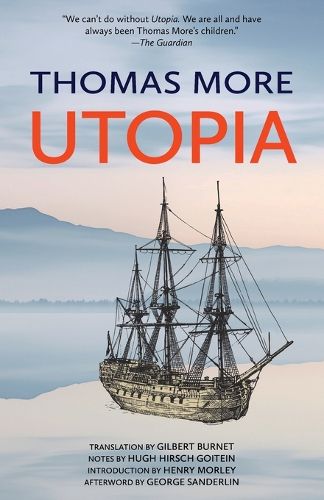Readings Newsletter
Become a Readings Member to make your shopping experience even easier.
Sign in or sign up for free!
You’re not far away from qualifying for FREE standard shipping within Australia
You’ve qualified for FREE standard shipping within Australia
The cart is loading…






This title is printed to order. This book may have been self-published. If so, we cannot guarantee the quality of the content. In the main most books will have gone through the editing process however some may not. We therefore suggest that you be aware of this before ordering this book. If in doubt check either the author or publisher’s details as we are unable to accept any returns unless they are faulty. Please contact us if you have any questions.
Utopia, a term coined by Thomas More from the Greek meaning "nowhere," envisions an imaginary island where a perfect society flourishes. This groundbreaking work of socio-political satire, divided into two books, offers a detailed account of the customs, governance, and daily life within this ideal community.
In Book One, More crafts a narrative through correspondence with real-life acquaintances he met across Europe, lending credibility to his fictional creation. The story then shifts to a dialogue between More and a well-traveled philosopher, Raphael Hythlodaeus, who critiques the social ills of contemporary Europe.
Book Two transports readers to the New World, where Raphael recounts his journey beyond Brazil, after parting ways with the explorer Amerigo Vespucci, to the island of Utopia. Here, he spends five years observing the islanders' way of life, where unique practices include the election of a prince, the equitable redistribution of people to maintain balanced populations, the ease of divorce, the absence of private property, gender equality in labor, religious tolerance, and a deep aversion to war.
Utopia is a seminal work that popularized the concept of imagined societies and inspired a wealth of early literature, including Tommaso Campanella's The City of the Sun, Francis Bacon's New Atlantis, and Voltaire's Candide. This robust Warbler Classics edition is based on the time-honored translation by Gilbert Burnet and includes notes by Hugh Hirsch Goitein, an introduction by Henry Morley, an afterword by George Sanderlin, a biographical sketch of More by Erasmus, and a detailed chronology.
$9.00 standard shipping within Australia
FREE standard shipping within Australia for orders over $100.00
Express & International shipping calculated at checkout
This title is printed to order. This book may have been self-published. If so, we cannot guarantee the quality of the content. In the main most books will have gone through the editing process however some may not. We therefore suggest that you be aware of this before ordering this book. If in doubt check either the author or publisher’s details as we are unable to accept any returns unless they are faulty. Please contact us if you have any questions.
Utopia, a term coined by Thomas More from the Greek meaning "nowhere," envisions an imaginary island where a perfect society flourishes. This groundbreaking work of socio-political satire, divided into two books, offers a detailed account of the customs, governance, and daily life within this ideal community.
In Book One, More crafts a narrative through correspondence with real-life acquaintances he met across Europe, lending credibility to his fictional creation. The story then shifts to a dialogue between More and a well-traveled philosopher, Raphael Hythlodaeus, who critiques the social ills of contemporary Europe.
Book Two transports readers to the New World, where Raphael recounts his journey beyond Brazil, after parting ways with the explorer Amerigo Vespucci, to the island of Utopia. Here, he spends five years observing the islanders' way of life, where unique practices include the election of a prince, the equitable redistribution of people to maintain balanced populations, the ease of divorce, the absence of private property, gender equality in labor, religious tolerance, and a deep aversion to war.
Utopia is a seminal work that popularized the concept of imagined societies and inspired a wealth of early literature, including Tommaso Campanella's The City of the Sun, Francis Bacon's New Atlantis, and Voltaire's Candide. This robust Warbler Classics edition is based on the time-honored translation by Gilbert Burnet and includes notes by Hugh Hirsch Goitein, an introduction by Henry Morley, an afterword by George Sanderlin, a biographical sketch of More by Erasmus, and a detailed chronology.